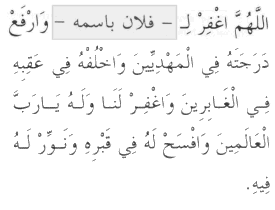Posted by Umm Sahl in Funeral Rites | 0 Comments
After The Last Breath
To read the previous part: Click Here
By Sheikh Ahmad Kutty
Obviously, the death of a dear one causes boundless grief and pain for the family. However, the pain is eased when they are mentally and spiritually prepared to accept the inevitable will of Allah. A true Muslim also finds inspiration from the example of the Prophet (upon whom be Allah’s blessings and peace) who had to cope with the death of many of his beloved ones, including his only son Ibrahim, whom he loved so ardently. When Ibrahim died, the Prophet (upon whom be Allah’s blessings and peace) expressed his grief with these words, “Our eyes shed tears, and our hearts grieve, but we speak only in a manner that pleases the Lord. O Ibrahim! We are indeed deeply pained by your departure.!” (Reported by Muslim and Abu Dawud)
On another occasion, when the Prophet’s grandson passed away, he sent word to his daughter saying, ” Allah has taken what is rightfully His to take, and He gives what is rightfully His to give, and so be patient before the decree of Allah, and seek rewards from Him.” (Reported by Bukhari).
A Muslim, therefore, exercises patience, and ensures that the dying is off to meet his Lord in the best manner.
Once the person has breathed the last, those attending to the mayyit should complete the following steps:
- Close his eyes immediately. You may also pray in the manner that the Prophet (upon whom be Allah’s blessings and peace) prayed when he closed the eyes of Abu Salmah when he died:

Allaahummaghfir li (name of the person) warfa’ darajatahu fil-mahdiyyeena, wakhlufhu fee ‘aqibihi fil-ghaabireena , waghfir-lanaa wa lahu yaa Rabbal-‘aalameena, wafsah lahu fee qabrihi wa nawwir lahu feehi.
“O Allah, forgive [name of the person] and elevate his station among those who are guided. Send him along the path of those who came before, and forgive us and him, O Lord of the worlds. Enlarge for him his grave and shed light upon him in it.” (Reported by Muslim)
- Remove all the personal ornaments, jewelry or belongings such as rings, necklaces and dentures from the body.
- Tie his chin to the head with a broad piece of cloth or band so that the mouth is not left wide open.
- Tie both legs together with a band.
- Cover the body with a sheet, preferably white, so that it is not exposed. The only exception is if the mayyit (deceased) is a male pilgrim, in which case the head should be left uncovered in deference to his starte of Ihram (consecration for Hajj).
Once death has been verified, all necessary steps should be taken to arrange a funeral without delay. Since it is most desirable that as many people as possible attend the funeral, all relatives and friends should be notified of the death.
According to the Qur’an, the faithful who face calamity, tragedy or death, should instantly recognize the sovereignty of Allah over life and death, and pray:
إِنَّا لِلَّهِ وَإِنَّآ إِلَيۡهِ رَٲجِعُونَ
Innaa Lillahi wa innaa ilayhi raaji’un
“To Allah we belong and to Him is our return.” (Al -Qur’an 2:156)
When a dear one passes away, a person tends to lapse into a state of despair and a feeling of helplessness. This is one of those times when the devil tries his best to cast doubts into a person’s heart about Allah’s decree, and prompts him to question Allah’s wisdom. A Muslim should resist this temptation by immediately turning to Allah for strength and support.
Allahumma ‘indaka ahtasibu museebatee, fa aajirnee feehaa wa abdilnee bihaa khayran minhaa
“O Allah! I seek rewards from You in my tragedy (by my patience to accept Your will without protest), so reward me, and follow up this tragedy with a beneficial outcome for me.”
To read the next part: Click Here

 Umm Sahl, your sister in Islam, a wife and mother of 3 beautiful blessed babies
Umm Sahl, your sister in Islam, a wife and mother of 3 beautiful blessed babies